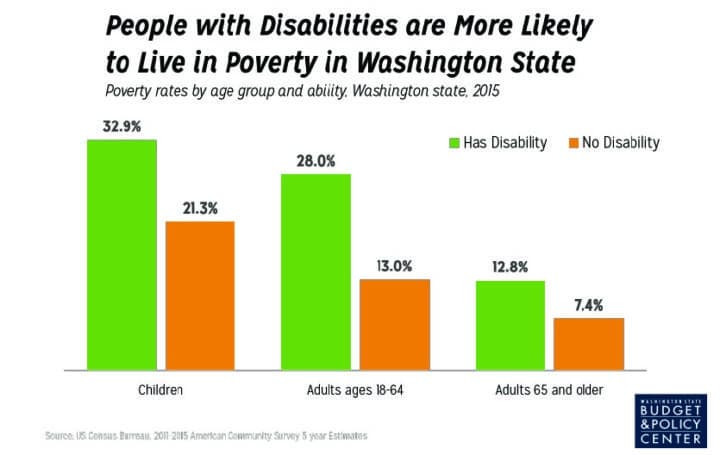
Far too many Washingtonians with disabilities are just one accident or mishap from financial catastrophe. SNAP plays a vital role in providing them with added financial security. Further, by ensuring they have the resources for adequate nutrition, SNAP offers them a key foundation of good health. Policymakers must protect this important program against funding cuts being proposed by Congress and President Trump.
Two out of five non-elderly individuals with disabilities in Washington state participate in SNAP. For them, it is an especially important resource because having a disability can make life more expensive and can make it harder to earn enough money to buy food and other necessities.
People with disabilities are more likely to live in poverty than those who don’t. In fact, as seen in the chart below, 33 percent of children with disabilities live below the federal poverty line in Washington state, compared to 21 percent of non-disabled children. And among 18 to 64 year olds, people with disabilities are twice as likely to live in poverty than non-disabled people. Given that this is the time of life when most people are in the workforce, earning income, and saving money, this data underscores how much harder it can be for people with disabilities to make ends meet without basic supports like SNAP.
[Click on graphic to enlarge.]
Despite the fact that SNAP provides important nutrition benefits to millions of low-income people with disabilities nationwide, President Trump has proposed shifting 25 percent of the federal cost of the program to states, which would cost Washington state an additional $363 million a year. Congressional House Republicans are also in the process of negotiating a 2018 budget resolution that will likely propose sweeping changes to SNAP, including cuts to overall spending and shifting costs to states. Among the other things the president and Congressional Republicans have proposed are:
- The elimination of a small SNAP benefit (called the “minimum SNAP benefit”) that seniors and people with disabilities can qualify for in connection with other public supports. This modest amount of additional assistance is critical for people living in poverty.
- Limits on the length of time people living in communities with high unemployment can receive SNAP. This is yet another challenge for people with disabilities who already have a difficult time finding work.
- New fees imposed on grocers who accept SNAP benefits, which will result in many grocers opting out of the program. This will obviously make it harder for SNAP participants to find stores where they can use their food assistance benefits.
Not only will none of these proposals help people move out of poverty; they will actually increase hardship for working families and millions of Americans with disabilities.
SNAP plays a vital role in ensuring that many Washingtonians with disabilities can put food on the table and have an opportunity to move out of poverty. As Congressional budget writers in Washington D.C. sit down to figure out how they will allocate public resources, Washington state’s elected officials should ensure that all residents – especially those with disabilities – have access to basic supports like SNAP.
To find out more about how SNAP is a critical resource for many people with disabilities, read the Center on Budget and Policy Priorities’ report, “SNAP Provides Needed Food Assistance to Millions of People with Disabilities.”
